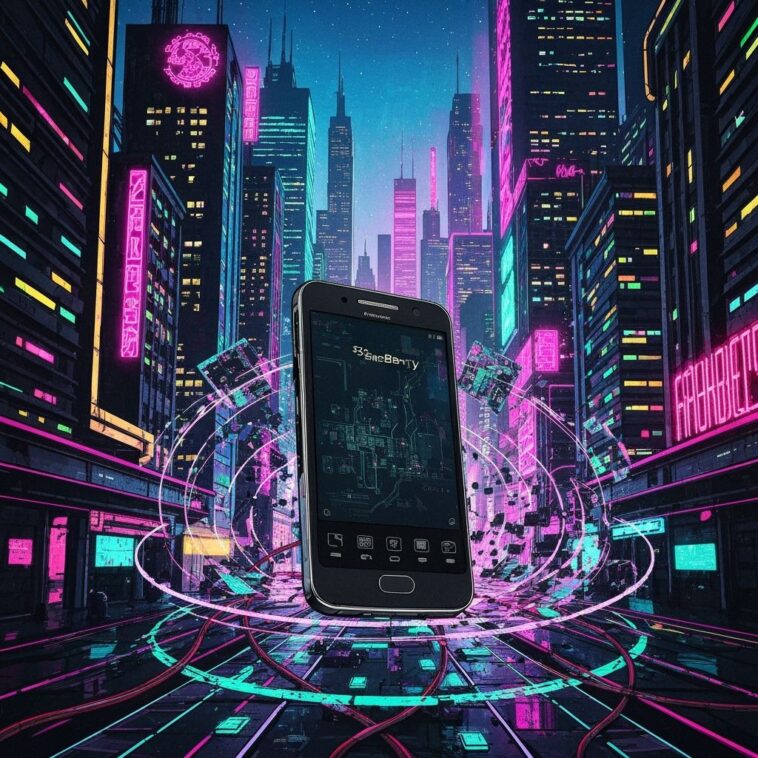The facts, as they were presented to innocent ol’ me on a Tuesday morning in 2025, seemed straightforward enough. A concerned technophile had approached me with what they believed to be evidence of a grand technological conspiracy—one involving the systematic elimination of the BlackBerry device for reasons far more sinister than market forces would suggest.
“Simba,” they said, leaning forward with the intensity of someone who had spent considerable time researching on reddit forums where usernames contain more numbers than letters, “they didn’t kill BlackBerry because it failed. They killed it because it worked too well.”
As any seasoned investigator of technological mysteries will tell you, when someone begins a conversation with “few understand this,” you are either about to uncover the greatest cover-up of the digital age, or you are about to waste several hours of your life that you will never get back. In this particular case, I suspected the latter, but professional curiosity demanded investigation.
The Evidence Presented
My informant laid out their case with the methodical precision of someone who had clearly rehearsed this presentation in their bathroom mirror. The evidence, they claimed, was overwhelming and had been hiding in plain sight all along.
First, there was the matter of the removable battery. Unlike modern smartphones, BlackBerry devices allowed users to physically remove the power source, thereby creating what conspiracy theorists consider the holy grail of privacy: a device that could actually be turned off. “Your current device is permanently on,” they explained, “listening and following you. The BlackBerry was the last phone that let you escape.”
The second piece of evidence involved various governmental reactions to BlackBerry’s security features. During the London riots, police reportedly complained about their inability to track rioters who were using BlackBerry Messenger (BBM). Several Middle Eastern countries had banned or threatened to ban BlackBerry devices due to their inability to access the encrypted communications. Even the former US President, Barack Obama had been permitted to keep his BlackBerry due to its superior security features.
“Don’t you see?” my informant continued, their voice dropping to what they clearly believed was a conspiratorial whisper. “A phone that let you pull the battery was a threat to the system because it meant you could leave.”
The Counter-Investigation
However, as I delved deeper into this mystery, alternative explanations began to emerge. A curious piece of evidence presented itself: if this elaborate surveillance conspiracy were true, why were the most vocal proponents of the conspiracy theory sharing their revelations on platforms like X (formerly Twitter), Facebook, and various internet forums—the very surveillance apparatus they claimed to fear?
“I’m using an iPhone to share this truth about how they killed BlackBerry to spy on us,” one digital truth-seeker had posted, apparently without detecting any irony in their methodology. The post had been shared 847 times, each share creating a digital trail that would make any surveillance operation remarkably efficient.
This led me to examine what I call the “Conspiracy Theorist’s Paradox”: the phenomenon whereby individuals who claim to fear digital surveillance choose to broadcast their resistance using the most surveilled communication methods available on planet earth! It was as if the French Resistance had decided to coordinate their operations through Nazi radio broadcasts.
The iPhone Factor
As I continued my investigation, a pattern emerged that seemed far more mundane than the grand conspiracy my informant had outlined. In January 2007, a little-known company called Apple had introduced a device that would fundamentally alter the mobile landscape—not through surveillance capabilities, but through something far more powerful: superior user experience (Tim Cook clearly never got the memo).
The evidence was overwhelming. While BlackBerry users were pecking away at physical keyboards and navigating through menu systems that seemed designed by people who had never actually used a phone, iPhone users were pinching, zooming, and swiping their way through an interface that felt almost magical. BlackBerry’s idea of innovation was adding more buttons; Apple’s innovation was eliminating them entirely.
“But what about the security features?” my informant protested when presented with this alternative theory. “What about the removable battery?”
This raised an interesting question: if the primary appeal of BlackBerry was its security and privacy features, why had the general public—the supposed victims of this surveillance conspiracy—abandoned it so enthusiastically for devices that offered demonstrably less privacy?
The Uncomfortable Truth About Consumer Preferences
The investigation revealed an uncomfortable truth that conspiracy theorists seem reluctant to acknowledge: most people simply don’t prioritize privacy and security when making technology purchasing decisions. They prioritize convenience, aesthetics, and social status. The average consumer was more concerned with being able to play Angry Birds than with whether their device could be truly turned off.
Market research from the period revealed that BlackBerry users were abandoning their devices not because of government pressure or corporate manipulation, but because they wanted to watch YouTube videos without the experience resembling a slideshow. They wanted cameras that didn’t require a computer science degree to operate. They wanted apps that did more than just push email.
The data was damning: BlackBerry’s market share collapsed precisely when consumers had alternatives that offered superior functionality, not when governments demanded increased surveillance capabilities.
The Psychology of the Grand Narrative
As I neared the conclusion of my investigation, I began to understand the true nature of the mystery. The BlackBerry conspiracy theory wasn’t really about BlackBerry at all—it was about the human need to believe that important events have important causes. The idea that a revolutionary communication device could be destroyed by something as mundane as poor user interface design and outdated technology was somehow less satisfying than believing it was eliminated by shadowy forces protecting the deep state.
“They killed it because it worked” is a far more compelling narrative than “they killed it because consumers preferred devices that could display more than 12 colors and didn’t require a stylus to perform basic functions.” The conspiracy theory transforms BlackBerry users from people with outdated technology preferences into digital freedom fighters, which is considerably more flattering.
The Final Deduction
After examining all available evidence, interviewing numerous witnesses, and analyzing market data, I can now present my conclusion with confidence: BlackBerry was not eliminated by a surveillance conspiracy. It was eliminated by the iPhone, Android, and the irresistible force of consumer preference for devices that could do more than just handle email and text messaging efficiently.
The removable battery, while indeed offering genuine privacy benefits, was not enough to overcome BlackBerry’s fundamental failure to evolve with consumer expectations. The security features that made it attractive to government officials and privacy advocates were ultimately irrelevant to consumers who wanted to share photos on social media and download games.
The real conspiracy, if there was one, was far more mundane: it was the conspiracy of market forces, user experience design, and the inexorable march of technological progress. Sometimes the most obvious explanation—that consumers chose better products—is actually the correct one.
The Irony Continues
Perhaps the greatest irony of this entire investigation is that the same individuals who claim BlackBerry was eliminated to facilitate surveillance are now conducting their resistance movement using devices and platforms that offer far less privacy than the BlackBerry ever did. They are posting their theories on Facebook, sharing them on Twitter, and discussing them on Reddit—all while carrying smartphones that, as they correctly note, cannot truly be turned off.
The surveillance capabilities they fear are not the result of BlackBerry’s elimination—they are the result of the ecosystem that replaced it, which they have enthusiastically adopted while simultaneously complaining about its existence.
What do you think—was BlackBerry really eliminated by surveillance conspiracies, or did it simply lose to better user experience? And if you’re convinced your phone is spying on you, why are you still using it to tell everyone about it? Are we all just willing participants in our own digital surveillance because the apps are too convenient to give up?





GIPHY App Key not set. Please check settings